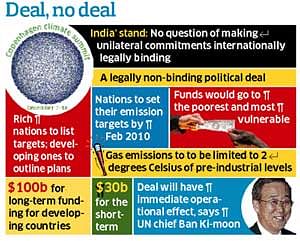

The dramatic twists and turns in the 12-day conference to combat global warming came after an extended all-night plenary session in which an overwhelming number of nations, comprising the G77 and the poor bloc, rejected the deal between the US and BASIC countries—Brazil, South Africa, India and China. Unwilling to go empty-handed, US President Barack Obama and Prime Minister Manmohan Singh delayed their departures on Friday night by several hours. Obama surprisingly walked into a meeting of the BASIC leaders and hammered out a legally non-binding political deal.
The three-page US-BASIC accord, taken as the final conference draft, contain elements like limiting temperature rise to 2 degrees Celsius above the pre-industrial levels, peaking of global and national emissions as soon as possible, factoring in overriding priorities of poverty for developing nations. After a break in the plenary session with a number of countries supporting the accord, Danish Prime Minister Lars Rasmuessen, w
ho chaired the conference, announced the decision to “take note” of the agreement instead of formally approving it.
UN Secretary General Ban-ki Moon said: “We have a deal, which is just the beginning of a process to evolve a binding pact on controlling greenhouse gas emissions.” He said the Copenhagen agreement “will have an immediate operational effect.”
The deal was brought to the plenary as a draft document but was strongly opposed by Sudan, Cuba, Bolivia, Venezuela and some other countries on grounds that it lacked specific targets for reducing carbon emissions. They contended it was one-sided and suicidal. However, Japan, Germany, Britain and the Maldives supported the deal.
Rasmuessen said: “If we strictly stick to the principle of consensus, this (the US-BASIC accord) cannot be adopted. I really regret it for this reason that we cannot adopt this document. It is true that this document cannot be put into operational effect. It is true but it is a reality.”
The deal calls on industrialised nations to set their emission targets by February 2010 and also asks the developing countries to emulate them.
In the contentious area of monitoring, verification and reporting, the deal says unsupported actions could be subject to assessment only by domestic institutions but adds a new provision for international consultations and analysis without impinging on national sovereignty.
On the finance side, the agreement provides $100 billion for long-term funding for developing countries and $30 billion for short-term, which will go to the poorest and the most vulnerable. The accord requires industrial countries to list their individual targets and developing countries to outline the actions they are willing to take to cut emissions. Many African and Latin American countries have termed the document unacceptable.
Deccan Herald is on WhatsApp Channels| Join now for Breaking News & Editor's Picks